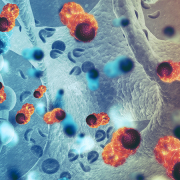Cancer vaccines: Three things you need to know
We shine a spotlight on RNA-based immunotherapies, which are fast becoming a major healthcare focus in the UK
As we reported last week, in January the UK government announced a partnership with BioNTech that aims to speed up development of RNA vaccines for cancer. But what are cancer vaccines, exactly? This week, we present three key things you need to know about these all-important personalised treatments.
Cancer vaccines are part of a wider group of cancer-fighting medicines called immunotherapies
The term ‘immunotherapy’ covers a range of treatments that work by using the body’s own immune system to kill cancer cells. They are different to cancer treatments such as chemotherapy and radiotherapy, which kill cancer cells directly.
In general, our immune systems are very good at detecting and destroying abnormal cells, and normally cells that would otherwise have become cancer are eradicated without us ever knowing they were there. However, some cancer cells develop ways of hiding from the immune system, or of producing signals that stop the immune system from attacking them.
Immunotherapies work in a range of ways to help the immune system recognise these cells and mount a response against them. For example, in CAR-T cell therapies the genomes of the patient’s white blood cells are edited outside the body to recognise cancer cells, and checkpoint inhibitors block the signals that prevent immune cells from attacking them.
Cancer vaccines are one of the newest immunotherapy approaches. Currently there are no true cancer vaccines approved by NICE, but it is an active area of research and various clinical trials are currently underway.
These are vaccines that you use after illness develops, not before
The vaccines most of us are familiar with, such as the Covid-19 vaccine, the flu vaccine and the immunisations given to children, all aim to prevent people from catching a particular disease in the first place, or from becoming seriously ill when they do.
These conditions are generally caused by contagious pathogens such as bacteria and viruses, and the idea is to have the vaccine before you encounter the pathogen. The vaccine stimulates the immune system to make antibodies against the pathogen, so that when the real thing is encountered later it is recognised instantly and has less chance to take hold.
Cancer vaccines work the same way, but they aim to treat existing cancers by helping the immune system recognise proteins called ‘tumour-specific antigens’, which are found in cancer cells but are much less common in heathy cells.
In case you were wondering, the HPV vaccine for cervical cancer is not a true cancer vaccine because it does not treat cancer; rather, it helps prevent the leading cause of cervical cancer by protecting against a virus that causes cell changes that can lead to cancer.
There are different types of cancer vaccine
Just as there are many different types of vaccine for contagious diseases, there are also a number of vaccination approaches being tried for cancer.
As outlined above, the main goal of a cancer vaccine is to present tumour-specific antigens to the immune system, so that it recognises them as a threat and destroys cells displaying them.
DNA and RNA vaccines contain instructions to make these antigen proteins; however, other types of vaccine already contain the antigen protein molecules (these are known as protein or peptide vaccines). There are also virus vaccines, which use a harmless virus to deliver cancer antigens such as proteins or peptides into the body (the immune system responds as it normally would, and ends up primed against the cancer antigens). Finally, researchers are also looking into whole-cell vaccines, which involve taking whole cancer cells from the patient and changing them in a laboratory to make them easier for the immune system to detect.
The UK government announced in January that clinical trials of RNA-based immunotherapy could begin as early as this autumn and that, if they are successful, the vaccine could be rolled out as part of standard cancer care pathways.
–








